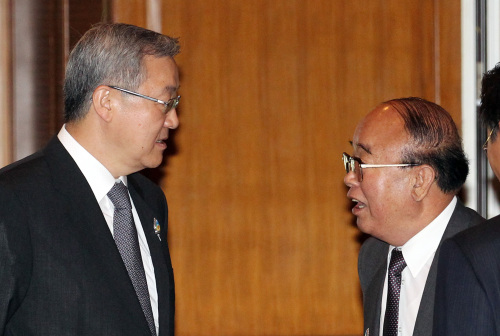Hopes are rising that the long-stalled six-party talks may resume as the two Koreas held a rare official talk for the first time since 2008.
The South Korean top nuclear envoy Wi Sung-lac and his North Korean counterpart Ri Yong-ho held surprise talks in the Indonesian island of Bali on Friday.
“Our meeting was constructive and fruitful,” Wi told reporters after the talk. “We have agreed to make joint efforts in the upcoming denuclearization talk processes.”
The South Korean top nuclear envoy Wi Sung-lac and his North Korean counterpart Ri Yong-ho held surprise talks in the Indonesian island of Bali on Friday.
“Our meeting was constructive and fruitful,” Wi told reporters after the talk. “We have agreed to make joint efforts in the upcoming denuclearization talk processes.”

North Korean envoy Ri also said that the two Koreas would work together to resume the six-party dialogue as soon as possible, officials said.
During this Bali talk, neither brought up the two incidents for which the South had been demanding an apology for ― the torpedoing of the South Korean Cheonan corvette Cheonan and the North Korean shelling on the South Korean northwestern border island of Yeonpyeong. As the North denied responsibility for either, the incidents have for long held back the inter-Korean relationship.
In an apparent move to keep the momentum for dialogue going, Foreign Minister Kim Sung-hwan met with his North Korean counterpart Pak Ui-chun on the sidelines of the ASEAN Regional Forum on Saturday.
The foreign ministers from 27 countries who participated in the forum also adopted a joint statement supporting the denuclearization talks between South and North Korea.
The inter-Korean talks in Bali came as Seoul has turned to the two-track strategy, softening its stance of demanding Pyongyang’s apology as pre-condition for dialogue and seeking to restart talks despite the incidents.
South-North contacts in the Indonesian resort are considered the first step of the three-stage dialogue formula leading to the six-party forum before it enters the second phase with Pyongyang-Washington talks. The third and final round would be the resumption of six-party talks on the North’s denuclearization and possible assistance to Pyongyang in return.
In addition to the two Koreas, the six-party talks would include the United States, Japan, Russia and host China.
U.S. Secretary of State Hillary Clinton and Japanese Foreign Minister Takeaki Matsumoto also welcomed the long-awaited dialogue between the North and the South, and adopted a joint statement on Saturday to encourage sustainable progress in the future.
The inter-Korean contacts in Bali elated politicians here in Korea. “I believe that the Bali talks will greatly contribute to the development of the inter-Korean relationship,” said Rep. Hong Joon-pyo, chairman of the ruling Grand National Party. Rep. Sohn Hak-kyu of the main opposition Democratic Party also expressed hopes that the event may act as a key to breaking the six-party talks deadlock.
Despite expectations for the thawing of frosty ties between Seoul and Pyongyang in the wake of the Bali meeting, Cheong Wa Dae calls for caution on the outlooks of inter-Korean relations.
“It would be premature to expect immediate changes,” said a key official from the presidential office.
“Inter-Korean relation may not advance unless North Korea makes official apologies for the Cheonan and Yeongpyeong attacks.”
Clinton also stressed that North Korea should first achieve a number of tasks in order to improve its ties with South Korea, if it wishes to come back to the roundtable.
This was largely in response to the concerns that the North may regard the inter-Korea talks as a mere stage to reach out to Washington.
Despite Clinton’s approach, however, it is the majority opinion that the Pyongyang-Washington talks may no longer be a reality as the North may once again carry out another nuclear test.
“Though there are varying opinions about the timeline and details, participants have agreed that the six-party talks and its three-step formula need not be changed,” said Russian Foreign Minister Sergey Lavrov at the ARF.
“The recent circumstances make us all anticipate the resumption of the stalled communication.”
By Bae Hyun-jung (tellme@heraldcorp.com)









![[Kim Seong-kon] Democracy and the future of South Korea](http://res.heraldm.com/phpwas/restmb_idxmake.php?idx=644&simg=/content/image/2024/04/16/20240416050802_0.jpg&u=)







![[KH Explains] Hyundai's full hybrid edge to pay off amid slow transition to pure EVs](http://res.heraldm.com/phpwas/restmb_idxmake.php?idx=652&simg=/content/image/2024/04/18/20240418050645_0.jpg&u=20240418181020)

![[Today’s K-pop] Zico drops snippet of collaboration with Jennie](http://res.heraldm.com/phpwas/restmb_idxmake.php?idx=642&simg=/content/image/2024/04/18/20240418050702_0.jpg&u=)